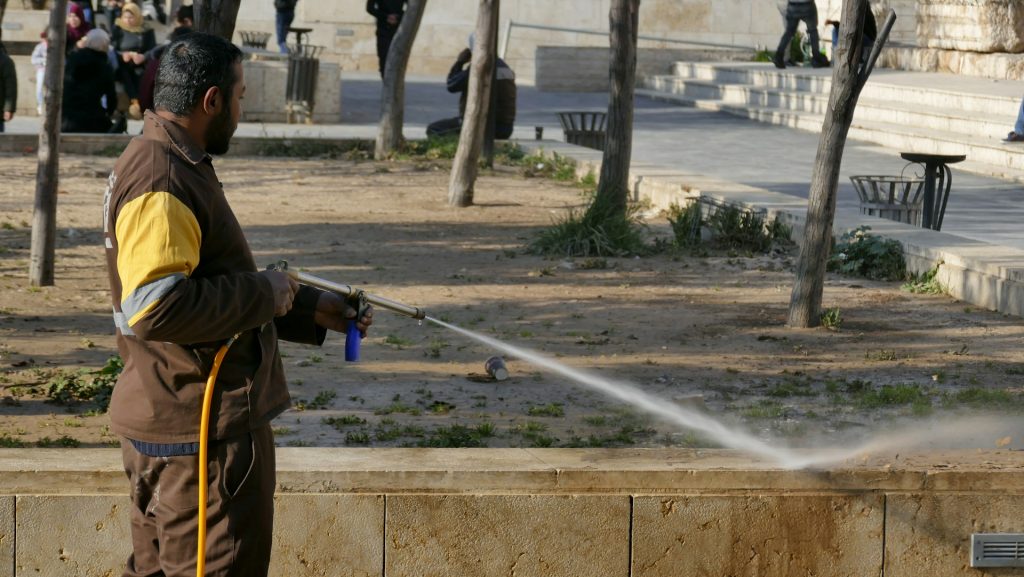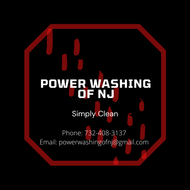Power Washing vs. Pressure Washing: What’s the Difference and Which Do You Need?
In the world of property maintenance, cleaning is one of the most essential tasks, especially when it comes to the exteriors of homes and businesses. Homeowners and business owners often turn to high-pressure cleaning techniques to restore their properties to their original state. Among the most common methods are power washing and pressure washing. However, many people use these terms interchangeably, not realizing that they refer to two distinct cleaning methods. Understanding the difference between the two is crucial when determining which one to use for specific cleaning needs.

This article will dive into the key differences between power washing and pressure washing, outline their various applications, discuss the benefits of each method, and provide guidance on when to choose each one. We’ll also examine the importance of using the correct equipment and when to hire a professional for these services.
1. Understanding Power Washing and Pressure Washing
1.1 What is Power Washing?
Power washing is a cleaning method that uses high-pressure water combined with heated water to remove dirt, grime, mold, mildew, and other contaminants from surfaces. The use of hot water is the distinguishing feature of power washing, as it helps break down tougher stains, grease, and organic buildup that would otherwise be difficult to remove with cold water alone.
- Water Temperature: Hot
- Pressure Level: High
- Best For: Concrete, driveways, sidewalks, and heavily stained surfaces
Power washing is particularly effective for cleaning surfaces that have been severely affected by oil, grease, mold, or other tough stains. The heat loosens debris and helps sanitize surfaces in a way that cold water cannot.
1.2 What is Pressure Washing?
Pressure washing, on the other hand, uses cold water under high pressure to clean surfaces. Unlike power washing, it does not rely on heated water. Pressure washing is effective for general cleaning tasks where heat is not needed to remove dirt, mildew, or dust.
- Water Temperature: Cold
- Pressure Level: High
- Best For: Wood decks, siding, fences, patios
Pressure washing is typically used for regular maintenance and lighter cleaning jobs. It’s an ideal method for surfaces like wood and vinyl, where the application of heat might cause damage.
2. Key Differences Between Power Washing and Pressure Washing
Below is a comparison table highlighting the primary differences between power washing and pressure washing:
| Feature | Power Washing | Pressure Washing |
| Water Temperature | Heated Water | Cold Water |
| Best Use Cases | Tough stains, grease, oil, mold removal | General cleaning, mildew, dirt removal |
| Ideal Surfaces | Concrete, brick, driveways, heavily soiled areas | Wood, vinyl siding, softer surfaces |
| Effectiveness | More aggressive, ideal for deep cleaning | Gentler, good for maintenance |
| Cost | Slightly higher due to heating costs | Generally more affordable |
Power washing is more effective for deep cleaning, while pressure washing is better for routine upkeep.
3. When Should You Choose Power Washing?
Power washing is the preferred method for situations where heat can help break down tough contaminants. This includes surfaces that have been exposed to heavy traffic, oil stains, or biological growth such as mold or mildew.
3.1 Ideal Applications
- Driveways & Sidewalks: Power washing is perfect for removing deep-seated oil stains and grime that accumulates over time, especially in areas with heavy vehicle traffic.
- Garage Floors: Power washing can eliminate automotive grease, tire marks, and other stains that often linger on garage floors.
- Brick & Concrete: These porous materials tend to trap algae, moss, and mildew. Power washing can effectively clean and restore these surfaces.
- Commercial Spaces: High-traffic areas like parking lots, industrial sites, and warehouses can greatly benefit from power washing to maintain cleanliness and remove stubborn stains.
3.2 When to Avoid Power Washing
- Wooden Decks & Fences: The heat from power washing can warp, crack, or damage softer wood surfaces.
- Vinyl Siding: Excessive heat can warp or fade vinyl surfaces, causing irreversible damage.
- Roof Cleaning: Power washing with heated water may weaken shingles, leading to accelerated wear and tear and a shortened lifespan for your roof.
4. When Should You Choose Pressure Washing?
Pressure washing is best suited for surfaces that don’t require the added power of heated water. It’s ideal for regular cleaning of less stubborn dirt and grime, as well as maintenance tasks on surfaces that are delicate or prone to damage.
4.1 Ideal Applications
- House Siding: Pressure washing is a safe and effective way to remove dirt, dust, and light mildew from vinyl, wood, or stucco sidings.
- Wooden Decks & Fences: Pressure washing is safe for softer materials when used with the appropriate pressure settings, making it ideal for cleaning wooden decks and fences.
- Patios & Outdoor Furniture: Safely clean outdoor surfaces without risking damage to delicate furniture or paved areas.
- Gutters & Downspouts: Pressure washing helps remove debris from gutters and downspouts, preventing blockages and ensuring proper water flow.
4.2 When to Avoid Pressure Washing
- Deep Stains or Grease: Cold water pressure washing is not effective for breaking down grease or oil-based stains. Power washing is a better choice for such stains.
- Surfaces Requiring Disinfection: While pressure washing removes dirt and grime, it is not as effective as power washing for killing mold spores or bacteria, which may be necessary in certain situations.
5. Choosing the Right Equipment for Power and Pressure Washing
When selecting a pressure or power washer, understanding the ratings and equipment specifications is crucial. The two primary factors to consider are PSI (Pounds per Square Inch) and GPM (Gallons per Minute).
5.1 PSI & GPM Ratings Explained
- PSI (Pounds per Square Inch): This measures the pressure exerted by the water. The higher the PSI, the more powerful the stream of water.
- GPM (Gallons per Minute): This measures the water flow rate. A higher GPM indicates a more powerful flow of water, allowing you to clean larger areas more quickly.
General PSI and GPM guidelines for different surfaces:
| Surface Type | Recommended PSI | Recommended GPM |
| Wood Decks & Fences | 1,200 – 1,500 PSI | 1.4 – 1.8 GPM |
| Vinyl Siding | 1,300 – 1,600 PSI | 1.5 – 2.0 GPM |
| Driveways & Sidewalks | 2,500 – 3,000 PSI | 2.5 – 3.0 GPM |
| Brick & Concrete | 3,000+ PSI | 3.0+ GPM |
The higher the PSI, the more effective the cleaning. However, a higher PSI should be used cautiously, especially on delicate surfaces.
6. DIY vs. Professional Power/Pressure Washing
6.1 Pros and Cons of DIY Cleaning
While power and pressure washing may seem like tasks you can handle yourself, there are pros and cons to consider:
Pros:
- Lower Cost: DIY cleaning is often cheaper than hiring professionals.
- Convenience: You can clean on your own schedule.
- On-Demand Cleaning: You don’t have to wait for an appointment.
Cons:
- Risk of Property Damage: Incorrect pressure settings or improper technique can cause damage to surfaces.
- Safety Risks: High-pressure water can cause injuries if not handled correctly.
- Limited Effectiveness: For stubborn stains, you might not achieve the same results as a professional.
6.2 Benefits of Hiring a Professional
Hiring a professional ensures that the job is done correctly and efficiently. Some benefits include:
- Expert Surface Assessment: Professionals can assess the best cleaning method and pressure for your surfaces.
- Proper Equipment & Cleaning Agents: They use high-quality equipment and cleaning agents that are safe and effective.
- Time & Effort Savings: Professionals can complete the job more quickly and efficiently.
- Long-Lasting Results: A professional service minimizes the risk of damage, ensuring that your surfaces stay intact and clean for a longer period.
7. The Environmental Impact of Power & Pressure Washing
Both power washing and pressure washing can have environmental impacts if not managed properly. It’s important to consider the following factors:
7.1 Water Conservation & Runoff Management
- Regulations: Many areas have regulations on runoff water, so it’s important to manage wastewater disposal.
- Biodegradable Cleaning Agents: Using eco-friendly cleaning solutions reduces harm to plants and animals.
- Water Reclamation Systems: Some professionals use systems that capture wastewater for proper disposal or treatment.
7.2 Eco-Friendly Power Washing Practices
To minimize the environmental impact of power washing, consider:
- Using lower pressure where possible to reduce water usage.
- Opting for hot water instead of harsh chemicals.
- Hiring trained professionals who understand eco-friendly practices and use minimal-impact solutions.
8. Which Service Do You Need?
- Power Washing is Best for You If: You need deep cleaning for concrete, driveways, or commercial spaces, dealing with tough stains or grease, or need a sanitizing effect in high-traffic areas.
- Pressure Washing is Best for You If: You need regular maintenance for siding, decks, or fences, need to preserve delicate surfaces, or want to prevent damage to wood, vinyl, or painted surfaces.
Conclusion
Both power washing and pressure washing are effective cleaning methods, but choosing the right one depends on the surface material and the nature of the cleaning task. Power washing is ideal for heavy-duty cleaning of tough stains, grease, and mold, especially on concrete and similar hard surfaces. Pressure washing, on the other hand, is more suited for routine maintenance and lighter cleaning of more delicate surfaces like wood and vinyl.
When in doubt, it’s always wise to consult with professionals to ensure that the correct method is chosen, and that the job is done safely and effectively. Whether you are looking to clean your driveway or maintain your home’s exterior, understanding the differences between these two methods will help you make the best decision.
Pressure Washing and Power Washing Services
We are a family owned and operated power washing business located in Brick NJ and servicing the surrounding townships of Howell, Jackson, Toms River, Lakewood, and Manchester. We offer high quality pressure washing and power washing services for both residential and commercial clients. We use our knowledge of each exterior material to make the informed decision whether to pressure wash or power wash as well as which kind of detergent or cleaning agent to use. We offer side walk cleaning, roof cleaning, gutter cleaning and more. Our experience in the power washing industry helps guide us to professionally power wash or pressure wash your house, roof, or side walk. We will meet and beat your expectations leaving your home, roof, or property cleaner than you ever imagined possible.
CONTACT US
We will get back to you as soon as possible.
Please try again later.
Pressure Washing vrs. Power Washing
The main difference between having something pressure washed versus having something power washed is power washing uses heated water while pressure washing relies on the force of the jet stream to pressure clean. Something that is heavily soiled or full of grime would benefit more from a power wash but a professional power washer can tell you if it is safe to power wash that specific material. Not all materials will stand up to the heat of power washing. This is when you would use pressure washing machines.
Address: Toms River, NJ, United States
